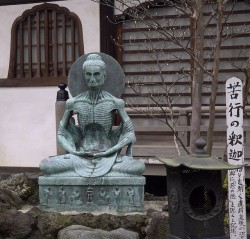“The unexamined life is not worth living.” ~ Plato
The basic premise of spirituality is that we are setting in, rather than out, in search of a place we have never left, yet somehow do not know.
The most basic form of intelligence is this ‘knowing’—the capacity to simply be present and awake. This wakefulness is the essence of common-sense. Knowing or basic awareness is the most common of all senses. How is it possible that we are, on some level, where we have always been, yet remain disconnected from this knowing?
The answer is self-deception.
Self-deception is the willful ignorance of common sense. We stubbornly ignore the more uncomfortable aspects of our life, in the same way that a small child insists that they are not tired while yawning. It is a blatant disregard of knowing itself.
Self-deception begins with insecurity—some scar we are ashamed of and want to hide.
While the blemishes differ from one person to the next, the fear and insecurity that animates those blemishes are universal. Perhaps our fear of commitment clutches onto our bachelor lifestyle, or maybe we cling to our partner because they conceal our fear of being abandoned or unlovable. Others might cleave to their work because it masks their fear of loneliness; while still others frantically hold onto the intellect because it camouflages the belief in their own insufficiency.
We desperately cling to these distractions in order to avoid our fear of fear. These cosmetic distractions create a blind-spot or some aspect of our experience we have disowned or refuse to look at. We spin off creating webs of distraction that cover our naked body. We spackle over our embarrassment with contrived story lines.
After a while, we can no longer differentiate the true from the false.
We can’t tell the difference between our flesh and the spackle. This inability to differentiate the true from the false is the birth of self-deception.
Of all the manifestations of self-deception, arrogance is the most common.
Arrogance is born out of an intense attachment to certainty and security. When something attractive arises—some ‘thing’ that makes us feel safe and needed—we cling to it, which is to say we identify with it.
We hold onto our intellectual knowledge, the job, or a relationship as a way of proving we are valuable, worth-while, and loveable. Or we cling to the apparent freedom attached to our title of “bachelor” by staying within the safe and protected space of recreational dating, never committing to anyone and therefore never really making ourselves vulnerable.
We believe that the object to which we are attached says something about who we are—that those intellectual nuggets of wisdom committed to memory mean that we live in accord with such wisdom; that because society places value on our career, we feel meaning and value within; that because we are married we are not lonely or because we are alone, we are free.
Rather than exploring our loneliness in the midst of relationship, the sense of meaninglessness in the midst of busyness, or our confusion in the midst of knowledge, the arrogant mind tries to keep it all together by maintaining the illusion that every “thing” is good.
Well, “things” might be good. But how are you? You do understand—in fact, not only understand but feel—the difference between ‘things’ and who you truly are, don’t you? This is the question that arrogance avoids at all costs. An arrogant person is a person protected by a phalanx of credentials.
In an arrogant mind, there are certain things that are off limits—areas of our lives we are not willing to examine. We refuse to look without bias at the futility of our knowledge, our fairy-tale romance, or our insatiable work ethic, because we are afraid of seeing the truth of suffering we have spackled over.
If we see the truth, we lose our justification.
If we look deeply and see that the relationship is an insincere agreement between two people to fulfill inherited social expectations, then we would no longer be able to take the relationship seriously. If we turn our attention toward our work ethic and realize that it is a cover up for an addiction to busyness that enables us to avoid the intolerable marriage we feel trapped in, then the justification burns up and we are forced to face the truth of our motives without any anesthetic. At this point we do not just see that our marriage is in trouble, we feel it. This un-anesthetized vantage point demands change, and the arrogant mind seeks to avoid change at all costs.
Arrogance is a fear of change, so it looks for distractions, various forms of entertainment that redirect our attention when our mind begins to wander into these restricted areas. We fill the gaps with credentials, but there is a problem: we were there when these narratives were written, so we know they are contrived. We know it is bullshit. This is the knowing we spend our entire lives trying to disown.
This act of disowning breeds anxiety. It turns us into a salesman. We need others to buy stock in our persona, so we start pitching our alternative self to anyone and everyone who will listen. Our deception begins to bleed out into our relationships.
Our inauthentic life rests squarely upon the foundation of deception we have laid. As our persona expands, so does the foundation. Eventually, our persona is sharing space with the persona of others. Not only is the image that we have cultivated and the life that we have planned for ourselves dependent upon the validation of those around us, but their image and the life they have planned is equally dependent upon our confirmation.
So, there is a trade-off: We validate their delusion in exchange for their validation of our delusion. And we know this on some level. That is why it is off limits.
The life we have built around our false self is a house of cards and each card is a credential—some badge or token meant to prove that we are “doing it right.” As our house expands we find that our cards are leaning up against the credentials that our friends and loved ones have used to construct their house. Ultimately, both parties agree to defend, at all costs, the foundation upon which both of these houses rest—the silent pact, “I won’t look, if you don’t.”
We defend our ignorance because we are terrified of being naked. In our hearts, we know the whole thing is a façade.
We feel the dishonesty—that innocence is never lost—but the ego just can’t make the leap. Its public relations policy won’t allow it. The ego is constitutionally incapable of being naked or honest. The ego is a mask, a persona. The ego is a covering. We can’t address ego at the level of the thinking mind. If we do, whatever rationale—however sophisticated—will become the ego’s new covering. This is what Chogyam trungpa referred to as spiritual materialism.
At some point we have to face the truth. We have to get honest with ourselves. But what exactly does this mean?
Getting honest with ourselves means recovering the vitality of an examined life. In an honest or humble mind there is no such thing as “out of bounds.” Honesty embraces our embarrassment as part of our path and in doing so melts away our shame.
We do not have to turn away from what we know, no matter how uncomfortable it might be. We may lose the life we had planned—the career, the partner, or what we think about ourselves—but in the same stroke we reconnect with the life that is unfolding from the center of our being. It is, as Trungpa Rinpoche, once said, a good news/ bad news situation: “The bad news is you’re falling through the air, nothing to hang on to, no parachute. The good news is there’s no ground.”
Getting honest means letting go of certainty and taking a leap into the deep space of the unknown, but there is nothing to fear because there is no ground to hit and go splat! However, there is no way to gain assurance or any consolation before you take this leap. Therefore, courage is the operable ingredient in honesty. We may feel squeamish or afraid, but we can wander into these restricted areas and work with what comes up.
This seems to be the basic point underlying all spiritual practice: No matter what we find, it is workable.
Our deception is sustained by validation.
We are always listening for an echo, some kind of lullaby. Meditation asks us to sit with our Self. In silence—the absence of an internal or external audience—deception cannot survive. Deception cannot breathe in silence. At first, the situation seems unmanageable.
It is obscured by our shame and convoluted by the complex webs of deception we have spun. Removing all the red tape and allowing the light of basic awareness to shine on our fears and insecurities brings clarity. In the light of observation, the fog of shame and the webs of deception begin to fall away and we recover simplicity. Our situation is revealed to be workable. It might be sad but it is workable. In fact, that sadness is the intelligence that lives in our suffering. Underneath all the rubble, there is a lone survivor. It is our tender heart and we can feel it beating again.
Love elephant and want to go steady?
Sign up for our (curated) daily and weekly newsletters!
Editor: Catherine Monkman
Photos: Flickr, Flickr, Ahmad Mujaddid/Pixoto, Kristina Ruth/Flickr














Read 5 comments and reply